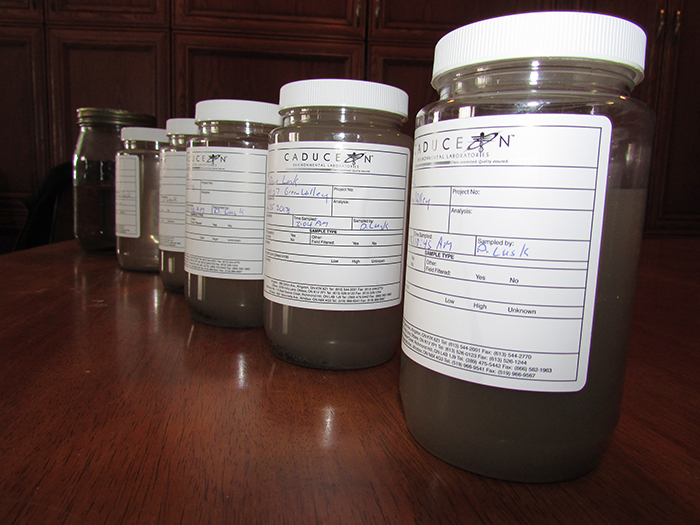
More well testing warranted, expert says
By Pam Wright
Local Journalism Initiative Reporter
A local geologist who sat on an expert panel advising the province on its recent all-hazard water well study in North Kent says the parameters of the investigation fell short.
According to Dr. Keith Benn, the Ministry of Health probe failed to examine the ultra-fine sediment of the 61 wells sampled in the study.
In fact, no sediment samples were taken at all.
“If there was somewhere where somebody seriously dropped the ball in the whole investigation, this is where it was dropped,” Benn said.
The independent consultant’s comments came at a public meeting held Nov. 20 to review the all-hazard study released earlier this year. Held at the Grace Christian Church Hall in the former Dover Township, around 40 people gathered to hear Benn’s analysis and to discuss next steps in North Kent’s ongoing water well saga.
Benn told the group that because the sediment was not examined, it remains unknown if carcinogenic heavy metals that exist are bio-accessible – harmful – to humans who consume the water.
“The smaller the particle the more there is potential for toxicity,” he explained.
Benn said the expert panel learned there was no collection of sediment after the fact. The panel also had no input on what wells were studied and only included wells in the immediate vicinity of the North Kent 1 wind project.
The province contracted Englobe to carry out the investigation, which concluded “there were no wide-spread health risks” identified even though there was a 300-per-cent increase in turbidity from baseline testing taken in 2017. But it also recommended further study should be done.
The North Kent 1 wind farm consists of 34 wind turbines in an agricultural area that is underlain by an interface aquifer providing water in domestic wells. The aquifer is composed primarily of sands and gravels, as well as glacial till derived from the underlying bedrock geological formation known as Kettle Point black shale.
Area residents have long complained their water was negatively impacted following the construction and operation of the wind farm.
Dover area wells were excluded from the all-hazard study, even though there are many wells with severe turbidity problems.
The first five turbines were built around Dover Centre in 2007, followed by construction of the East St. Clair Wind Farm in the former Dover Township in 2012-2013.
Meeting organizer Christine Burke, who lives in Dover with a well that produces black water, denounced all levels of government, noting Premier Doug Ford in 2018 had promised a health hazard study of the wells.
Photocopies of the letter from Ford dated May 5, 2018, committed to the health-hazard study, were distributed at the meeting.
Burke said she feels abandoned by all levels of government and said that people are still drinking water that could be toxic.
“I feel for people who may be drinking water that is harmful to them,” Burke said.
However, Burke and her husband Terry decided to take further action. They had their well water tested by an accredited lab in Michigan that included the health hazard parameters.
When the sediment was analyzed, it showed that potentially toxic metals, including antimony, arsenic, barium, cadmium, lead and nickel were present in what Benn calls “rather high” concentrations, noting further sampling of the well water and sediment is warranted to determine if these metals are bio accessible.
The Burkes, along with Benn, encourage affected residents to get their wells tested so they can present the collective results to the government.
Burke said she would help other property owners pay for the testing, which costs around $600 US, by crowdfunding through Go Fund Me or Give Send Go.
“If you know anybody who wants to do this, we can work together,” Burke said. “We can get this done.”
Benn said there is strength in numbers, adding the tests will provide proof.
“Somebody’s going to have to take responsibility,” Benn stated. “We’re getting to the point where it’s becoming more and more difficult for government to shrug their shoulders and turn away,” he said.
Benn is hopeful he can speak with municipal government on the issue, noting he hopes the municipality will reach out to the province for additional help.






